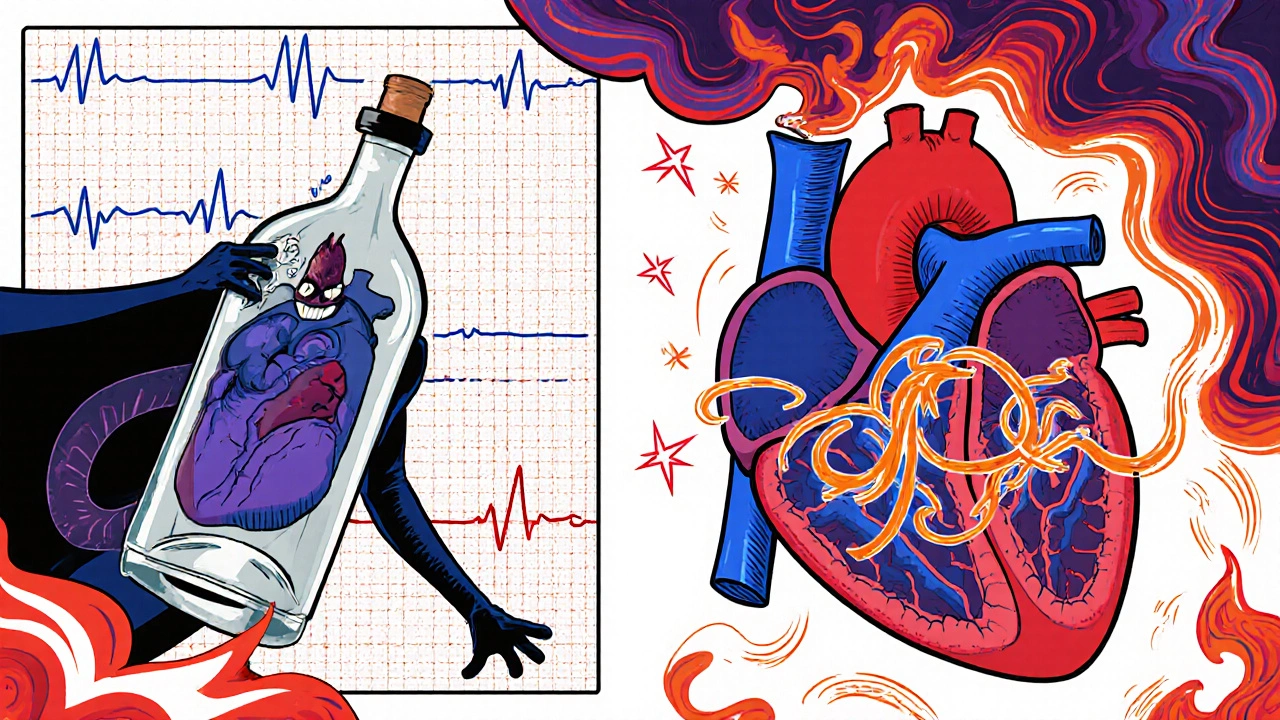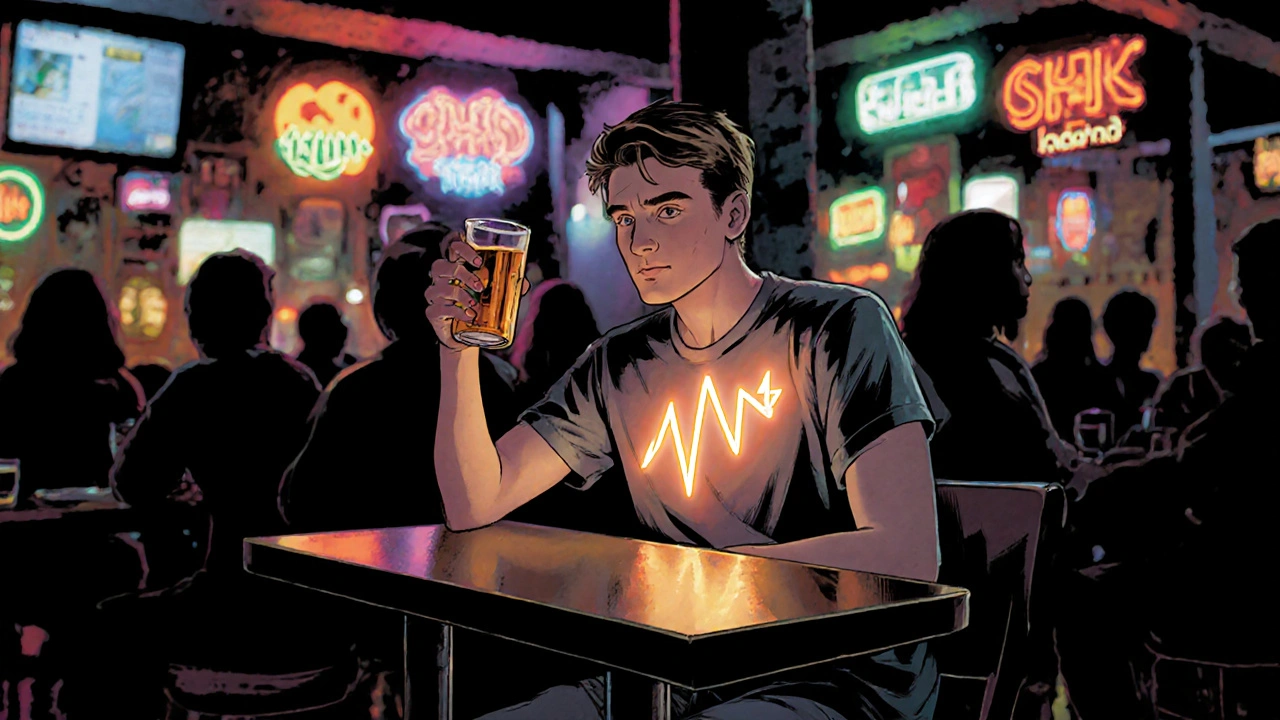Heart Rhythm Risk Calculator
Alcohol Consumption Risk Assessment
This tool estimates your relative risk of alcohol-related heart rhythm disorders based on your drinking patterns.
Your Risk Assessment
Ever wonder why a night out can leave you feeling a flutter in your chest? That uncomfortable thump isn’t just stress - it can be a warning sign that alcohol is nudging your heart’s electrical system off‑beat. This article untangles how drinking habits intersect with heart rhythm disorders, who’s most vulnerable, and what you can do to keep your pulse steady.
What Are Heart Rhythm Disorders?
Heart rhythm disorders are problems with the electrical signals that coordinate each heartbeat. When those signals misfire, the heart may beat too fast, too slow, or irregularly. Common forms include atrial fibrillation, ventricular tachycardia, and premature beats. Symptoms range from harmless palpitations to fainting or even sudden cardiac arrest.
How Alcohol Affects the Heart
Alcohol consumption introduces chemicals that alter the balance of electrolytes and autonomic nervous system tone, both of which are vital for stable heart rhythms. Ethanol metabolites can depress the vagus nerve, raise sympathetic activity, and trigger inflammation in cardiac tissue. Over time, these changes may scar the heart muscle, setting the stage for arrhythmias.
Arrhythmias Most Tied to Drinking
- Atrial fibrillation is the most common irregular rhythm, where the upper chambers quiver instead of contracting. A series of studies in Europe and North America show a 2‑3‑fold increase in AF risk after binge drinking.
- Ventricular tachycardia is a rapid rhythm originating from the ventricles, often life‑threatening. Heavy drinkers with underlying heart disease are particularly prone.
- Alcoholic cardiomyopathy is a weakened heart muscle caused by chronic heavy drinking, which can seed multiple arrhythmias.

Who Faces Higher Risk?
Age, gender, genetics, and existing conditions shape your susceptibility. Men over 45 who drink more than 14 drinks per week show the sharpest rise in AF incidents. Women, though generally drinking less, experience a similar risk boost once they cross the 7‑drink weekly threshold. People with hypertension, diabetes, or a family history of arrhythmias should treat even moderate drinking as a red flag.
How Much Alcohol Is Too Much?
Guidelines vary by country, but a useful rule of thumb is “no more than two standard drinks per day for men and one for women.” The risk curve isn’t linear; occasional binge episodes (five or more drinks in a single sitting) spike the chance of an arrhythmic episode by up to 50% within 24hours. Below is a quick reference:
| Weekly Drinks | Typical Risk Increase | Notable Arrhythmias |
|---|---|---|
| 0‑3 (women) / 0‑5 (men) | Baseline | Rare |
| 4‑7 (women) / 6‑14 (men) | 1.5‑2× | Atrial fibrillation, occasional premature beats |
| 8+ (women) / 15+ (men) | 3‑4× | AF, ventricular tachycardia, alcoholic cardiomyopathy |
| Binge (≥5 drinks/occasion) | Up to 50% rise in 24h | Transient AF, supraventricular tachycardia |
Detecting Alcohol‑Related Arrhythmias
When you feel a flutter, the first diagnostic tool is an electrocardiogram a painless test that records the heart’s electrical activity. A 12‑lead ECG can spot AF, premature ventricular contractions, or signs of cardiomyopathy. Wearable monitors and smartphone‑linked ECG patches are increasingly popular for spotting intermittent episodes that a single office visit might miss.
Managing and Reducing Your Risk
- Cut back or quit. Even cutting one drink a day can lower AF recurrence by 20% according to a 2023 New Zealand cohort study.
- Control blood pressure. Hypertension magnifies alcohol’s arrhythmic impact; aim for < 130/80mmHg.
- Stay hydrated. Dehydration spikes electrolyte imbalances, making ectopic beats more likely.
- Exercise regularly. Moderate aerobic activity improves autonomic balance and reduces AF onset.
- Seek medical advice. If you’ve had a palpitations episode, ask your GP about a Holter monitor or referral to an electrophysiologist.
When medication is needed, doctors may prescribe beta‑blockers, anti‑arrhythmic drugs, or anticoagulants (if AF is confirmed) to keep clot risk in check.
Frequently Asked Questions
Frequently Asked Questions
Can a single night of heavy drinking cause a permanent heart rhythm problem?
One binge episode can trigger a temporary arrhythmia, especially atrial fibrillation, but permanent damage usually requires repeated excessive drinking over months or years.
Is moderate wine consumption safe for people with a family history of AF?
Even low‑to‑moderate intake can modestly raise risk if you have a strong genetic predisposition. Discuss personal limits with your cardiologist.
Do caffeine and alcohol together increase arrhythmia risk?
Yes. Both stimulate the sympathetic nervous system; combined they amplify electrolyte shifts, making ectopic beats more likely.
Can regular exercise offset the harmful effects of alcohol on heart rhythm?
Exercise improves autonomic balance and can reduce AF episodes, but it does not fully cancel the risk from chronic heavy drinking.
What warning signs should prompt an immediate doctor visit?
Sudden rapid heartbeats, fainting, chest pain, shortness of breath, or a new irregular pulse lasting more than a few minutes warrant urgent evaluation.

Nickolas Mark Ewald
October 16, 2025 AT 19:30